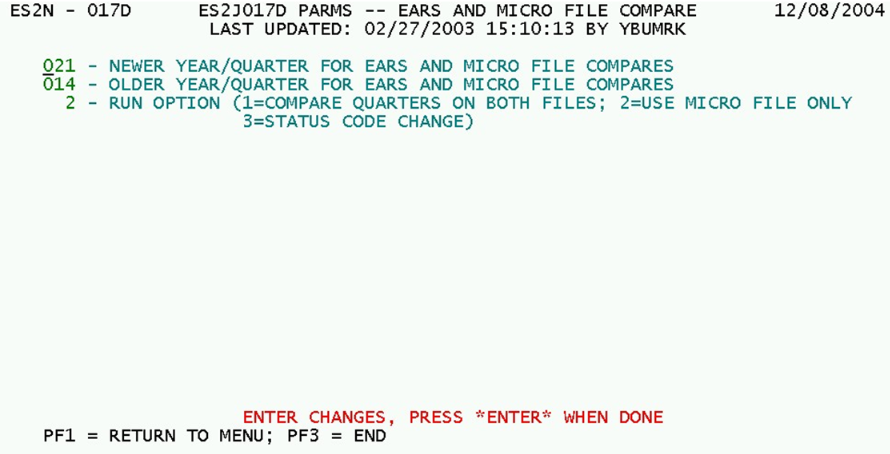14 job 017d ears micro quarterly code comparison
Job 017D - EARS and Micro Quarterly Code Comparison
Job 017D is not used as often as it used to be, since code change reconciliation between EXPO and EARS is somewhat more automated than in the past. It is primarily designed for spotting disparities in code changes between the Refiling and Micro Files, but can also be employed to compare the codes of any two quarters on the Micro File without regard to the refiling data. Yet another alternative is to look for status code changes between micro quarters (without paying particular attention to code changes or refiling data). These options are described below.
1. Newer Year/Quarter for EARS and Micro File Compares - This 3-digit field (yyq format) identifies the newer of two quarters used for code comparisons. This is often the first calendar quarter, when most code changes are enacted.
2. Older Year/Quarter for EARS and Micro File Compares - Like the previous field, this year/quarter (yyq format) field addresses the other quarter to be compared as the pre-change quarter. Often, this will be the fourth quarter of the previous year, the time just before the code changes take effect.
3. Run Option - This switch instructs the job how to process the files. The three options are described below.
- a. ‘1’ (“Compare Quarters on Both Files”) - This option reflects the original design of the 017D job. It examines code changes found in the Micro File, comparing them to the code changes found in the Refiling File. It notes disparities between the two that ought to be resolved (such as incomplete refiling data).
- b. ‘2’ (“Use Micro File Only”) - This option excludes the Refiling File from comparison processing. It only needs to look at two quarters on the Micro File and note those that have code changes enacted between those two quarters.
- c. ‘3’ (“Status Code Change”) - This final option lists those establishments that have been activated or inactivated between two quarters. Since code changes are not a selection criterion, the quarter selections can range more widely than under the other two options.
Job 017D can be submitted on demand. However, since it is related to refiling processing and first quarter code changes, it is most commonly used during first-quarter clean-up operations, generally during the June through August time frame.
Related Links
